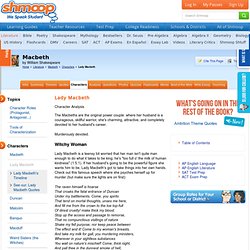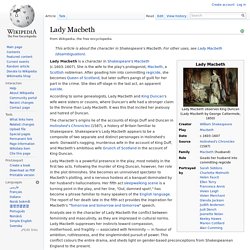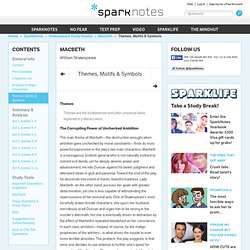

Macbeth Themes – Ambition And Power In Macbeth. Lady Macbeth in Macbeth. The Macbeths are the original power couple: where her husband is a courageous, skillful warrior, she's charming, attractive, and completely devoted to her husband's career.

Murderously devoted. Witchy Woman Lady Macbeth is a teensy bit worried that her man isn't quite man enough to do what it takes to be king; he's "too full o' the milk of human kindness" (1.5.1). If her husband's going to be the powerful figure she wants him to be, Lady Macbeth's got to take things into her own hands. Check out this famous speech where she psyches herself up for murder (but make sure the lights are on first): The raven himself is hoarseThat croaks the fatal entrance of DuncanUnder my battlements. Are you thoroughly creeped out? Remind us who the witch(es) are, again? Woman Up In fact, Lady Macbeth's whole "unsex me" speech aligns her with witchcraft and the supernatural (calling on spirits and talking about "smoke of hell" and "murdering ministers" sure sounds witchy to us).
Lady Who? Star Performance. Lady Macbeth. According to some genealogists, Lady Macbeth and King Duncan's wife were sisters or cousins, where Duncan's wife had a stronger claim to the throne than Lady Macbeth.

It was this that incited her jealousy and hatred of Duncan. The character's origins lie of the accounts of Kings Duff and Duncan in Holinshed's Chronicles (1587), a history of Britain familiar to Shakespeare. Shakespeare's Lady Macbeth appears to be a composite of two separate and distinct personages in Holinshed's work: Donwald's nagging, murderous wife in the account of King Duff, and Macbeth's ambitious wife Gruoch of Scotland in the account of King Duncan. Analysts see in the character of Lady Macbeth the conflict between femininity and masculinity, as they are impressed in cultural norms. Macbeth: Themes, Motifs & Symbols. Themes Themes are the fundamental and often universal ideas explored in a literary work.

The Corrupting Power of Unchecked Ambition The main theme of Macbeth—the destruction wrought when ambition goes unchecked by moral constraints—finds its most powerful expression in the play’s two main characters. Macbeth is a courageous Scottish general who is not naturally inclined to commit evil deeds, yet he deeply desires power and advancement. He kills Duncan against his better judgment and afterward stews in guilt and paranoia. The Relationship Between Cruelty and Masculinity Characters in Macbeth frequently dwell on issues of gender. At the same time, however, the audience cannot help noticing that women are also sources of violence and evil.
Ultimately, the play does put forth a revised and less destructive definition of manhood. The Difference Between Kingship and Tyranny In the play, Duncan is always referred to as a “king,” while Macbeth soon becomes known as the “tyrant.” Motifs Violence Blood.